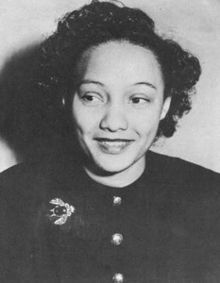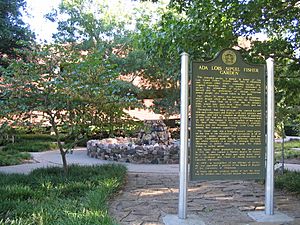Ada Lois Sipuel Fisher facts for kids
Quick facts for kids
Ada Lois Sipuel Fisher
|
|
|---|---|
 |
|
| Born |
Ada Lois Sipuel
February 8, 1924 Chickasha, Oklahoma, U.S.
|
| Died | October 18, 1995 (aged 71) Oklahoma City, Oklahoma, U.S.
|
| Alma mater | Langston University University of Oklahoma |
| Occupation | Lawyer |
| Known for | Key figure in the Oklahoma civil rights movement |
| Spouse(s) | Warren Fisher (m. 1944) |
Ada Lois Sipuel Fisher (born February 8, 1924 – died October 18, 1995) was a very important person in the Civil Rights Movement in Oklahoma. She wanted to become a lawyer. To do this, she applied to the University of Oklahoma's law school. Her goal was to challenge the state's unfair laws that kept Black and white people separate.
Contents
Early Life and Education
Ada Lois Sipuel was born in Chickasha, Oklahoma. Her parents were Rev. Travis Bruce Sipuel and Martha Belle Smith. She was a very good student.
In 1941, she graduated from Lincoln High School as the best student in her class. She first went to Arkansas Agricultural, Mechanical & Normal College. Then, in 1942, she transferred to Langston University.
On March 2, 1944, Ada Lois Sipuel married Warren Washington Fisher in Chickasha. She graduated from Langston University with honors on May 21, 1945.
Challenging Segregation in Court
Ada's brother, Lemuel Travis Sipuel, had also thought about challenging the unfair rules at the University of Oklahoma. But he decided to go to Howard University Law School instead. He didn't want to wait for a long court case.
Ada, however, was ready to put her law career on hold. She wanted to fight against segregation. Segregation was a system where Black and white people were forced to be separate. This often meant Black people had fewer opportunities.
The Supreme Court Case
In 1946, Ada applied to the University of Oklahoma. She was turned away because she was Black. This was against the idea of equal rights.
Two years later, in 1948, the highest court in the country, the U.S. Supreme Court, made a big decision. They ruled in a case called Sipuel v. Board of Regents of Univ. of Okla.. The court said that Oklahoma had to offer the same education to Black students as it did to white students.
Thurgood Marshall was the main lawyer for the NAACP in this case. He later became the first African-American Supreme Court Justice. All the justices agreed with Ada. This case was an important step. It helped pave the way for the famous Brown v. Board of Education case later on. That case ended segregation in public schools across the country.
Ada's Law School Journey
To follow the Supreme Court's order, Oklahoma created a new law school. It was at Langston University, a school for Black students. But this new school was not as good as the University of Oklahoma's law school.
So, more legal action was needed. Finally, on June 18, 1949, Ada Lois Sipuel became the first African-American student admitted to the University of Oklahoma's law school. By this time, she was married and expecting her first child.
Facing Challenges at School
Even though she was admitted, Ada still faced unfair treatment. The law school gave her a special chair marked "colored." This chair was separated from the rest of the class by a rope. She also had to eat in a separate, guarded area of the cafeteria.
Despite these challenges, many of her classmates and teachers were kind to her. They welcomed her, shared their notes, and studied with her. They helped her catch up on what she had missed. Ada remembered that some white students would even crawl under the chain to eat with her when the guards weren't looking.
Ada's lawsuit and her school costs were paid for by many small donations. She felt she owed it to these people to succeed.
Later Life and Legacy
Ada Lois Sipuel Fisher graduated in 1951 with her law degree. She started practicing law in her hometown of Chickasha in 1952.
In 1992, the governor of Oklahoma, David Walters, appointed her to the Board of Regents for the University of Oklahoma. This was the same university that had once denied her admission. She said this appointment "completes a forty-five-year cycle." She also stated that because she had experienced unfair treatment, she would bring a new perspective to university decisions.
Before she passed away in 1995, Ada Fisher was a member of the Alpha Kappa Alpha sorority. She also taught as a professor at Langston University. She died in Oklahoma City in October 1995.
In 1996, she was honored after her death. She was added to the Oklahoma Women's Hall of Fame. The University of Oklahoma also created the Ada Lois Sipuel Fisher Garden in her honor.
Family Background
Ada Lois Sipuel married Warren Washington Fisher on March 2, 1944. He was born in Paris, Texas.
Ada's parents, Rev. Travis Bruce Sipuel and Martha Belle Sipuel, survived the terrible Tulsa Race Massacre in 1921. During this event, their house was burned down. They had moved to Tulsa around 1918 to help build a church. This church was for the Church of God in Christ (COGIC).
The church building was located in the Greenwood District. This area was known as "Black Wall Street" because it was a thriving Black community. Rev. Sipuel helped the church grow to 40 members during his time there.
See also
- Category:Tulsa race massacre (re: survivors)
 | James Van Der Zee |
 | Alma Thomas |
 | Ellis Wilson |
 | Margaret Taylor-Burroughs |


